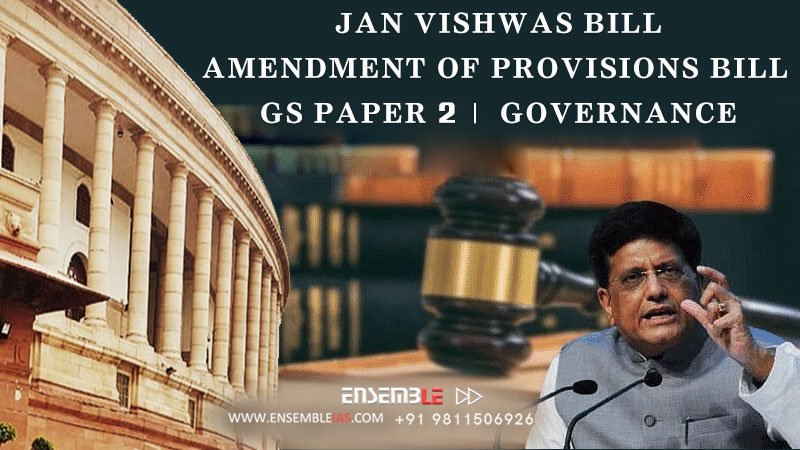Jan Vishwas (Amendment of Provisions) Bill
Aim of the Bill
With regard to 42 laws affecting the environment, agriculture, media, industry and trade, publication, and other areas that pose obstacles to doing business in the nation, the Jan Vishwas Bill seeks to decriminalise about 180 offences.
It aims to stimulate the economic ecosystem, enhance public welfare, and totally eliminate or replace imprisonment terms with monetary punishments. Under other areas, the bill also suggests compounding offences.
The link to join the course : Online Courses
In general, the draft suggests the following amendments to current Acts:
- Decriminalisation of crimes
- All offences and sanctions under the Indian Post Office Act of 1898 are repealed by the Bill.
- Modifications to grievance resolution procedures and the selection of one or more adjudicating officers to decide on punishments. These officers have the authority to investigate alleged violations of the relevant Acts and even subpoena witnesses to provide testimony.
- A regular review of the fines and punishments for numerous violations of the relevant Legislation. The Bill suggests raising the minimum amount by 10% every three years.
Need for this law
The backbone of the Indian economy is micro, small, and medium-sized firms, which considerably boost the GDP (GDP). Effective and efficient business policies that cut out superfluous red tape must be in place for small businesses to transition to the formal sector and produce jobs and money.
The parliamentary committee also mentions in its report that investors are significantly discouraged by regulatory burden. Discrepancies between the laws that are now in place may result in unneeded and even conflicting compliance obligations.
Furthermore, extended wait times for required clearances can drive up prices and discourage entrepreneurship. Due to easier processes and more investment, proposed adjustments will hasten investment choices.
The Law also aims to lighten the load on the judiciary in addition to “decriminalisation”. According to the National Judicial Data Grid, as of July 2023, there were 4.4 crore pending cases, of which 3.3 crore were criminal cases.
Settlement of many issues by compounding approach, adjudication and administrative mechanism, without involving courts, will enable persons to correct minor infractions and defaults, often committed inadvertently by them, and save time, energy and resources.
The purpose of the bill is to encourage enterprises, make life easier for people, and lessen the fear of being imprisoned for minor offences. This will support “trust-based governance.
Through The Jan Vishwas (Amendment of Provisions) Bill, 2023, a total of 183 provisions are being proposed to be decriminalized in 42 Central Acts administered by 19 Ministries/Departments. Decriminalization is proposed to be achieved in the following manner: –
(i) Both Imprisonment and/or Fine are proposed to be removed in some provisions.
(ii) Imprisonment is proposed to be removed and fine retained in few provisions.
(iii) Imprisonment is proposed to be removed and Fine enhanced in few provisions.
(iv) Imprisonment and Fine are proposed to be converted to Penalty in some provisions.
(v) Compounding of offences is proposed to be introduced in few provisions.
For effective implementation of the above, the bill proposes measures such as (a) pragmatic revision of fines and penalties commensurate to the offence committed; (b) establishment of Adjudicating Officers; (c) establishment of Appellate Authorities; and (d) Periodic increase in quantum of fine and penalties
It is also ensured that degree and nature of punishment is commensurate with the severity of the offence.
The benefits of the Amendment Bill are outlined as under:
- The Amendment Bill will contribute to rationalizing criminal provisions and ensuring that citizens, businesses and the government departments operate without fear of imprisonment for minor, technical or procedural defaults.
- The nature of penal consequence of an offence committed should be commensurate with the seriousness of the offence. This bill establishes a balance between the severity of the offence/violation committed and the gravity of the prescribed punishment. The proposed amendments ensure the adherence to law by businesses and citizens, without losing the rigor of the law.
- The criminal consequences prescribed for technical/procedural lapses and minor defaults, clog the justice delivery system and puts adjudication of serious offences on the back burner. Some of the amendments proposed in the Bill are to introduce suitable administrative adjudication mechanisms, wherever applicable and feasible. This would go a long way in reducing undue pressure on the justice system, reduce the pendency of cases and help in a more efficient and effective justice dispensation.
- Decriminalisation of provisions which affect citizens and certain categories of government employees will help them live without the fear of imprisonment for minor violations.
- The enactment of this legislation would be a landmark in the journey of rationalising laws, eliminating barriers and bolstering growth of businesses. This legislation would serve as a guiding principle for future amendments in various laws. Consolidated amendments in various laws with a common objective will save time and cost for both Government and Businesses alike.
Best Online Coaching for Civil Service_IAS_ UPSC_IFS_IPS
Free Study Material ENSEMBLE IAS ACADEMY | Call +91 98115 06926 | Visit us:- https://ensembleias.com/ | Online Store: https://online.ensemble.net.in/
#janvishwasbill #judiciary #amendment #provisions #bill #governance #GS2 #Governance #Jan_Vishwas #UPSC_GSPaper2 #GS_Paper_2 #ensembleiasacademy #geographyoptional #k_siddharthasir #ias #civilservices #upsc_motivation #upsc_aspirants #upsc_exam




